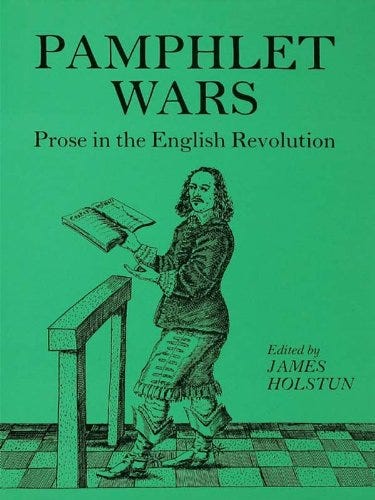Disinformation is nothing new. The English Revolution of 1642-60 produced an explosion of stylistically and ideologically diverse pamphlet literature.1 The public sphere exploded with pamphlets on all sides.2
Forged and falsified publications formed part of a sophisticated propaganda strategy employed by the parliamentarian war party, aimed at discrediting Charles I during the first months of the conflict.3
In addition to factual pamphlets meant to keep the masses abreast of the developing situation, a reader could find laws, wrathful polemics, and of course biting satire. All were being produced and disseminated in pamphlet form at this time.4
Pamphlets and Pamphleteering in Early Modern Britain. sketches a complex definition of a 'pamphlet', showing the coherence of the literary form, the diversity of genres and imaginative devices employed by pamphleteers. It explores readers' relationship with pamphlets and how both influenced politics. 5
Holstun, James. Pamphlet Wars: Prose in the English Revolution. London, England: F. Cass, 1992.
D. Zaret, The Origins of Democratic Culture: Printing, Petitions and the Public Sphere in Early Modern England (Princeton, N.J., 2000).
White, William. 2019. “Parliament, Print and the Politics of Disinformation, 1642–3.” Historical Research 92 (258): 720–36.
Washington, Brittney (2018). A Pamphlet War in England, 1641-1643. The Collation. Folger Shakespeare Library.
Raymond, Joad. (2003). Pamphlets and Pamphleteering in Early Modern Britain. Cambridge: Cambridge University Press.





What a treat, an Ebla to E-Books post waiting for me this morning. I looked around but couldn't find the Christmas tree. As always, educational and pertinent to far more than the period and details in the post. Congratulations, and thanks.
Kathleen:
Do you know of a go-to source that comprehensibly analogizes the pamphleteering of the English Civil War with respect to that of the American Revolutionary War over a century later?